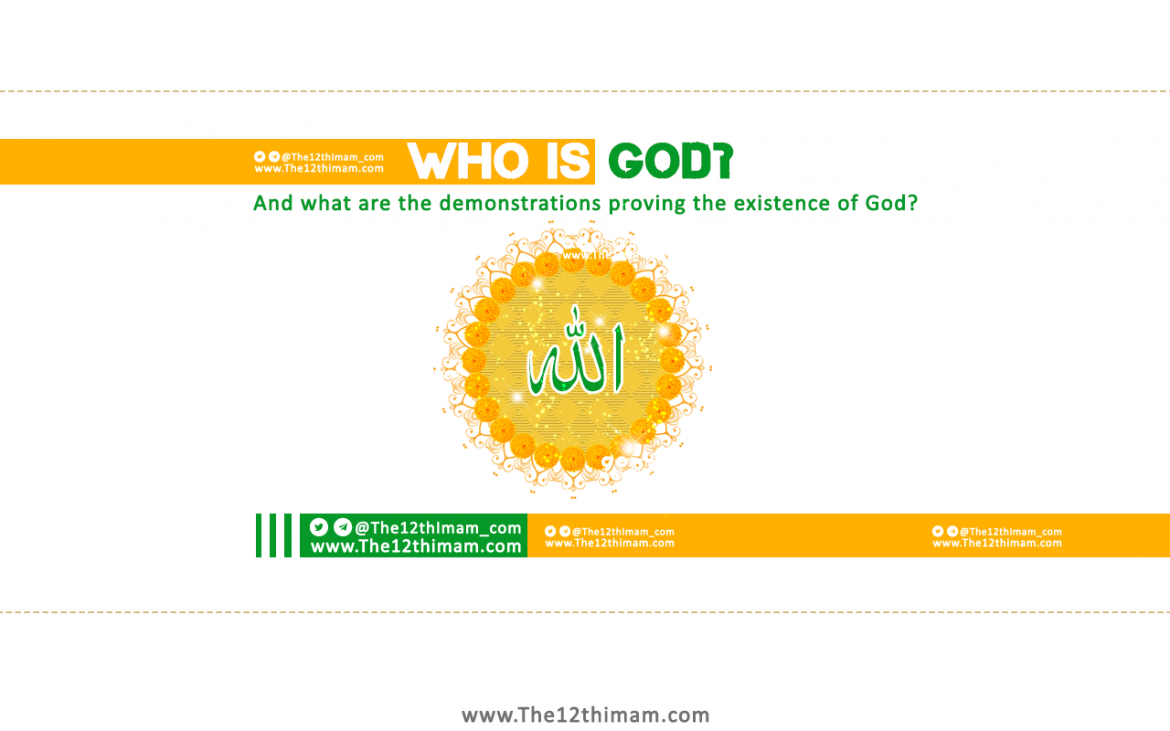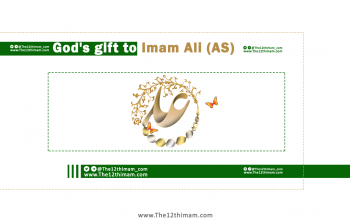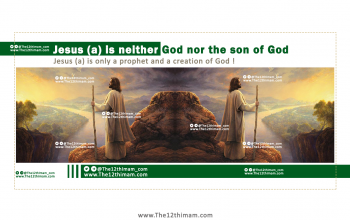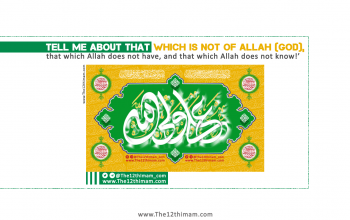God, the creator of the universe and the most complete existence, is the pivotal concept of most religions, particularly Abrahamic religions. The sublime God is the Absolute Being and the Absolute Perfection who does not have any defects and shortcomings. He is a unique existence who has the ability of doing everything, and is aware of all things in all states and times. He is All-hearing and All-seeing, and has volition and freewill. He is alive and is the creator of all; He is the origin of all benefactions and goodness, and is kind toward all of them. In the opinion of Shi‘a, God is unique and is the origin of all perfections; He is the creative cause of all creatures and has a pre-eternal and eternal essence. No creature is like Him. His essence is the same as His attributes. He is a reality who is non-composite with no quiddity. He cannot be seen in this world or in the hereafter, and has an absolute knowledge and power. He is ubiquitous and has a complete relation with His creatures. The existence of God and some of His attributes are provable via senses, intellect, and natural disposition; however, the true nature of His unlimited essence is not ascertainable with the limited senses and intellect. Moreover, the specific name of God, which is pointed out many times in Qur‘an, is Allah. According to Islamic beliefs, Allah is not a god exclusive to Islam; rather, He is God of previous prophets and is God of the first of the prophets to the last of the prophets. Based on the verse 172 of chapter 7 in Qur‘an, the creation of Adam has been along with the recognition of the unique God, and that polytheism has been fashioned after the monotheism and is the result of the humans’ deviation during the course of the history.
Although the inner truth of God’s essence is not recognizable, there are many ways to achieve certainty as to the existence of the unique and sublime God. The ways to recognize God are categorized into a general classification as follows:
- Intelligibility demonstration
- Natural disposition demonstration
- Order in nature demonstration
- Causal demonstration
- Miracle demonstration
- Necessity and possibility demonstration
- Decisions cancelation demonstration
- Truthful ones demonstration
Here, some of the aforesaid demonstrations will be dealt:
Intelligibility demonstration or rational precaution
One of the ways to prove the existence of God is the intelligibility of believing in Him, because one is faced with these two ways: belief in God, or disbelief in God.
On the other hand, each of these two beliefs has some parameters. For instance, one who believes in God should accept that because God is All-wise, He has not created the human and the universe futilely. Rather, He has a goal which is guiding the human and taking him to his ultimate perfection. Therefore, He has sent the prophets and Imams to guide him. Furthermore, after this world, there is another world in which humans see the punishment and reward of their acts. In this manner, belief in God goes together with belief in prophethood, Imamate, religious law, resurrection, and justice. On the contrary, disbelief in God has parameters other than what has been just mentioned.
If belief in God and its parameters are considered – which brings about the eternal blissfulness –and assessed against disbelief in God and its parameters, belief in God and its parameters can be found to be more logical. This is because we will receive more benefits and avoid eternal affliction if the belief in God, prophethood, Imamate, religious law, resurrection, and justice are true. However, if it becomes clear that such a belief is superstitious, then we will sustain no loss. Thus, it is logical if we accept the belief in God and its parameters.
An argument similar to this is narrated in the words and poetical works attributed to the successor of the Messenger of the unique God, i.e. the Commander of the Faithful Imam ‘Ali (a), as Imam ‘Ali (a) says in his poetical works,
Astronomer and doctor both think that
There is no resurrection, I said as you wish
If your words are true, I sustain no loss
But if my words are true, affliction reaches you (1)
Also, in another narration, he says,
Astronomer and doctor both said that
The dead will not be resurrected, I said go away
If your words are true, I sustain no loss
And if my words are true, affliction is on you (2)
Nonetheless, this narration refers to the beliefs of some of the doctors and astronomers, and it does not include all of them.
That is, if there is another world after death wherein belief in God and its parameters are true, then we are triumphant and eternally blissful, but you will sustain a big loss, the result of which is not to enter into the eternal heaven.
In another narration, there is a debate between the representative and proof of God, Imam Riza (a), with a heretic, which is written as follows:
One of the heretics entered a meeting in which Imam Riza (a) was present. Imam (a) told him, “O man! If your belief were true – while it is not so in reality – then would not we be equal to you? And prayer, fasting, alms tax, and admittance and approval do not harm us.” That man became silent. Then Imam (a) went on saying, “And if our belief were true and right – which is so – then would not your share be perdition (eternal loss) and our share be blissfulness?” (3)
Hence, it is more logical if we abstain from the probability of a big loss. This is because if one disbelieved in God (while, in fact, there existed God) and there existed resurrection, Day of Judgment, the hereafter, or heaven and hell, he would be inflicted with the eternal torment.
Natural disposition demonstration
The word “fitrat” (natural disposition) literally means “nature”. That God exists naturally has two meanings: first, proving His existence does not need reasoning and definition acquisition and like all self-evident premises, it is a necessary matter which is very clear. The unique God says in the noble Qur‘an, “Is there any doubt about Allah, the originator of the heavens and the earth?” (4) That is, approving the existence of a governing, knowing, and wise creator is necessary when one thinks through the creation of the universe. In other words, whenever one imagines in his mind the creation of the universe with this particular grandeur, immediately in his essence and natural disposition he approves and testifies to the existence of a wise, governing, and grand creator.
The other meaning with regard to the natural existence of God is that the human has a soul which seeks God. In fact, seeking God and finding Him are dominant in the bottom of his heart. If the veils of ignorance and materiality are removed for him, he finds God as a thirty person finds the thirst.
What is meant by “fitrat” (natural disposition) here is the second meaning because when the human, in the impasses of life, loses all the outward means – i.e., when the ignorance and veils are removed – he can see God with the eye of natural disposition, and involuntarily asks Him his rescue and answers for his needs.
Recognition of God, tendency toward Him, and the light of monotheism are hidden in the heart of all humans, but superstitious etiquettes and customs, false cultivation, misappropriate exhortations, ignorance, and vanity – especially at the time of welfare and abundance – put veils on it. Nonetheless, when the problems begin to pour from various walks of life and the vortex of troubles appears before the human, and when the human sees no control over the outward means and becomes disappointed utterly, it is then that the veils are removed and that luminous part of heart becomes revealed. This discards any blasphemous thought from the heart of such a person. During the course of these happenings, he becomes pure (5) and moves toward the supernatural world and God involuntarily.
For this, via this reasoning, many verses of the noble Qur‘an remind us of the blessing of the God-seeking disposition. (6)
Great divine leaders, Imams, and proofs of Islam also guided those who deeply doubted the issue of divinity. The following narration is an instance of this matter:
A suspicious man who was in doubt as to the issue of divinity came to the representative and proof of God, Imam Sadiq (a), and said, “O the child of the Messenger of God! Guide me who God is because tempters have made me doubting.” Imam Sadiq (a) said, “O the Servant of God! Have you ever been on a ship?” The man said, “Yes.” Imam (a) said, “Has your ship ever been broken where no other ship was around to save you and you had no power to swim?” He said, “Yes.” Imam said, “In that situation, did your heart say to you that there is an existence that can save you from that predicament?” He said, “Yes.” Imam Sadiq (a) said, “That is God who is able to save wherein there is no other rescuer and redresser.”(7)
Thus, through his heart and natural disposition, every human knows, recognizes, and inclines toward the omnipotent and knowing God who is life creator, kind, and so forth. Moreover, if due to some factors he takes no notice of the existence of God, he still cannot deny the occurrence of an incident in his lifetime in which he was entirely frustrated, causing him to recognize the existence of God.
Order in nature demonstration
In numerous parts of the noble Qur‘an, one can find verses that bring up different natural phenomena, categorizing them as sings for the existence of God and asking the human for contemplating and pondering over them.
A group of such verses invites the human to think about the signs of creation by God. These verses consider the order in the universe and in the human body as a reason and guide that leads the people of reason and reflection toward the sublime origin of the universe. For example, this point is mentioned in the Book of God, i.e. the noble Qur‘an, where it reads, “Behold! In the creation of the heavens and the earth, and the alternation of night and day, there are indeed Signs for men of understanding.”(8) It also reads, “On the earth are signs for those of assured Faith,* As also in your own selves: Will ye not then see?” (9)
Another group of Qur‘anic verses also cite some specific phenomena and introduce them as signs for the existence of God and divine knowledge and power.
Furthermore, leaders of religion and God’s representatives and proofs put a vigorous emphasis on following the method of the noble Qur‘an in “knowing God via sings”. For example, in a comprehensive tradition by Imam Sadiq (a), it is said that his Holiness addressed one of his companions:
O Mofazzal! Giving the form to this universe, collecting the parts, and giving them order is the first lesson and reason for the creator (Allah) – the Glorious and Almighty. Thus, if you, with thought and understanding, contemplate this world deeply and well, every moment you find it as a house wherein all the needs of God’s Servants are prepared. Sky, like the roof, has been heightened; earth, like the carpet, is spread; stars, like lights, are arranged; and gems, like treasures, are hidden in it. Everything is arranged in its proper place. And the human is like someone who is given the house and he is provided with everything. All kinds of plants and animals are procured for meeting his needs and his interests. All of these are the reason that the universe has been created by an exact, wise, ordered, proportionate, and coordinated measurement. Its creator is the One and He verily gives its form and order, and is the coordinator of its parts. (10)
It should be mentioned, first, there is no doubt that a precise order governs the universe, and there is no wise person who doubts the existence of order in materialistic creatures – from the atoms to the galaxies.
Second, the existence of order and governing is also impossible without having a verifier and governor. No wise man sees the order something which is made out of accident. Therefore, intellect necessarily determines that the order and governing in this world is a clear evidence for the existence of a wise governor. In the noble Qur‘an, God says, “Soon will We show them our Signs in the (furthest) regions (of the earth), and in their own souls, until it becomes manifest to them that this is the Truth.” (11)
Due to pondering over the structure of creatures, the human concludes that a wise verifier has created such an ordered structure. In other words, these ordered systems are the signs of a plan that lead us to God. The Commander of the Faithful, Imam ‘Ali (a), says, “Therefore, you look at the sun, moon, vegetation, plants, water, stone, the difference of this night and day…. Then woe be to him who disbelieves in the Ordainer and denies the Ruler” (12) (That is, he has sustained a loss and has lost the hereafter). Also, in another sermon, he says, “Allah has provided wonderful creations including the living, the lifeless, the stationary, and the moving. He has established such clear proofs for His delicate creative power and great might.” (13)
However, this demonstration is based on two premises: first, a sense-based premise which holds that humans, by the guidance of their senses, find all phenomena under the control of a wonderful order and integrity. And second, an intellect-based premise which states every systematic and consistent phenomenon, by the verdict of intellect, is the creation and artifact of a wise and intelligent verifier.
Both of these two premises are articulated by Imam ‘Ali (a) in the following two narrations, respectively: “Can there be any construction without a Constructor?” (14) He also says, “The effects of camel indicate the camel, the effects of donkey indicate the donkey, and the effects of footsteps indicate the passerby. Hence, how do not the structure of a sky with such delicacy and the earthly center with this much density indicate (Allah) the Subtle and the Informed?” (15)
Also, Hisham b. al-Hakam has narrated that one of the questions of a heretic who came to Imam Sadiq (a) was, “So, what is the reason for God?” Imam Sadiq (a) said, “The existence of odd things which are very sturdy while still indicate that a constructor has built these. Haven’t you seen that whenever you look at a heightened or coated house, you know that a constructor has built it even though you have not seen its constructor and you have not seen him at the time of its construction?” (16)
In another narration, to refute someone who denied the existence of Creator, [it is narrated that] Imam Sadiq (a) said to that denying person, “When you see a building, do you accept that it has a constructor and when you see a painting, do you accept that it has a painter?” That man said, “There is no other choice.” (17)
From these expressions by the proofs and representatives of God, one can figure out the principle of cognation well. Therefore, order – by the verdict of intelligence – implies an aware and governing verifier who is the very unique and sublime God.
As for this, it is written that a scientist made a model of the Solar System, hanging it from the ceiling of his academic workshop. Sometimes, he set it to turn and enjoyed its certain movement. That scientist had a friend who denied the existence of God; those two had discussed the existence of God many times. One day that disbeliever of God went to visit the scientist.
The scientist set the model to work. His friend asked with surprise, “Who has made this? With composure, the scientist said, “It has no constructor and is made by and of itself.” His friend said, “Such a thing is not possible.” After a long talk, the scientist said, “How does this small model of the Solar System have a constructor but the vast universe does not have any governing creator?”
If one contemplates the system of being and the creation, he would figure out the unique God, the governing creator and verifier, who has not created the universe futility.
Decisions cancelation demonstration
Of the demonstrations to prove God is the decisions cancelation demonstration which holds that annulment of decisions and the weakening of human wills are out of God’s volition and a reason for His existence. This demonstration has been derived from one of the sermons of Imam ‘Ali (a). It has been discussed in some books of interpretation, tradition, and philosophy. To some, some verses of the Qur‘an allude to the decisions cancelation demonstration, including the verses 8:24, 30:37, 39:52, and 53:25.
Based on this demonstration, humans sometimes give up a decision or quit a belief; these internal changes show the existence of God and His volition. Decisions cancelation demonstration is derived from the words of God’s representative and proof, i.e. Imam ‘Ali (a), who says, “I came to know Allah, the Glorified, through the breaking of determinations, resolving of hurdles, and change of intentions.” (18) (19)
It is said in a narration that someone asked the Commander of the Faithful, Imam ‘Ali (a), “With what did you know your God?” His Holiness said, “I came to know my God with the breaking of determinations and change of intentions. As I decided to do something, an obstacle appeared between my decision and intention and me. And as I decided to do it, destiny opposed my intention. By this, I understood that there is a governor other than me.” (20) In another narration, the Commander of the Faithful, Imam ‘Ali (a), is asked, “What reason is there for proving the creator?” Imam (a) says, “Three things: change of mood, weakness of faculties and forces, and the breaking of intentions.” (21)
Sometimes, one decides to do something and focuses his intention on doing it, but suddenly an obstacle appears in the heart and mind of that person, stopping him from performing his decision. Sometimes, these changes of decisions or cancelation of intentions happen many times. No one can deny that such a thing happens to everybody. However, the question arises that to what these obstacles should be attributed. It can be well understood from the words of God’s proof and vicegerent for the creatures of the universe, i.e. Imam ‘Ali (a), that these obstacles should be attributed to an issue outside the will of the human, that is, the Unseen world and God.
Thus, this tradition clarifies the meaning of “the breaking of determinations” for us. Also, the meaning of the second part of the aforesaid tradition points to the “resolving of hurdles”. That is, sometimes one faces difficulties and hurdles that he is unable to solve. Suddenly a door is opened to him and the way is paved for him; that resolver is nobody but God. The meaning of the third part, i.e. “change of intentions”, is also clear: since one of the aspects of magnanimity is intention, so the meaning of this part is the same as that of the first part, namely, breaking of determinations.
As a result, the reason and cause of cancelation of decisions points to the unique, governing, wise, and mighty God that, first of all, there is no Unique and Deity except Him and, second, all affairs of creatures are within His helm.
References:
- Bihar al-Anwar, vol. 78. p.87, narration no. 92; Matalib al-Mas’ul, p. 62.
- Poetical works attributed to Imam ‘Ali, p. 520.
- Kafi, vol. 1, p.78, narration no. 3; ‘Uyun akhbar al-riza, vol. 1, p. 131, narration no. 28.
- Qur‘an 13:10.
- Tafsir Nimunah, pp. 418-422, 423.
- Like the verses 29:65, 30:30, 10:12,22,23, 17:67, 39:8,49.
- Majlisi, Muhammad Baqir, Bihar al-Anwar, vol. 3, p. 41, Beirut, Dar Ihya al-Turath al-‘Arabi, 2nd edition, 1403 AH.
- Behold! In the creation of the heavens and the earth, and the alternation of night and day, there are indeed Signs for men of understanding (Qur‘an 3:190).
- On the earth are signs for those of assured Faith*As also in your own selves: Will ye not then see? (Qur‘an 51:20,21; also q.v.: 2:164, 45:3-6, 10:100,101, 13:10)
- Also q.v.: Nahj al-Balaghah, sermon 186; Al-Tawhid, Shaykh Saduq, 2nd chapter, narration no. 2; Bihar al-Anwar, ‘Allamah Majlisi, vol. 3, pp. 61,82,130,152.
- Qur‘an 41:53.
- Nahj al-Balaghah, sermon 185.
- Nahj al-Balaghah, sermon 165; Bihar al-Anwar, vol. 65, p.30.
- Nahj al-Balaghah, sermon 185.
- Jami‘ al-Akhbar, p. 35, narration no. 13; Bihar al-Anwar, vol. 3, p. 55, narration no. 27.
- Tafsir Ahl-i Bayt ‘Alayhum al-Salam, vol. 18, p.78; Al-Ihtijaj, vol. 2, p. 332/Nur al-Thaqalayn.
- Tafsir Ahl-i Bayt ‘Alayhum al-Salam, vol. 18, p.78; Nur al-Thaqalayn.
- Sharif Razi, Nahj al-Balaghah, Subhi Salih, 1414 AH, p. 511.
- Q.v.: Muhammad Riza’I & Hamid Falahati, “Probing the validity extent of the narration ‘Araftullah, and the extent of proving God and the attributes in the decisions cancellation demonstration”, p. 6.
- ‘Allamah Majlisi, Bihar al-Anwar, vol. 3, p. 42; institute of Al-Wafa, Beirut, Lebanon, 1404 AH.
- Ibid, vol. 3, p.55, narration no. 29.
Excerpts from:
Wiki Shi‘a
Shafaqna (taken from the lecture of Ayatollah Mazahiri)
Institute for Humanities and Cultural Studies (Muhammad Muhammadriza’i/Qabasat, 2001, no. 19).
islam quest
Center for Answers to Religious Questions (Javab.ir)
Alvahy.com



